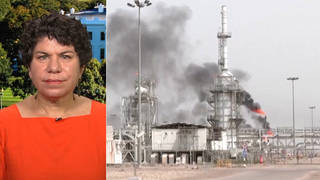
Guests
- Ro KhannaDemocratic U.S. congressmember from California and member of the House Armed Services Committee.
Four corporations control 90% of the baby formula market in the United States, and as a national baby formula shortage drags on, it has impacted working-class families of color the most. We get an update from Democratic Congressmember Ro Khanna of California, who just wrote an open letter urging leaders of federal agencies such as the Food and Drug Administration to take bolder action to address the shortage. Khanna discusses efforts to increase production domestically and supplement the shortage with formula from other nations, and why he is calling for President Biden to go further and pass antitrust laws to reduce reliance on corporate monopolies for vital products. “Why is it that we are so dependent on one or two manufacturers in this country?” says Khanna. “This is a problem not just in baby formula.”
Transcript
AMY GOODMAN: This is Democracy Now!, democracynow.org, The War and Peace Report. I’m Amy Goodman.
We turn now to look at the ongoing shortage of baby formula across the United States. In many cases, infant formula is a vital necessity, providing lifesaving nutrition to thousands of babies in the U.S. for whom breastfeeding is not possible due to allergies or immune conditions or other situations.
The crisis started last October after a whistleblower sent the Food and Drug Administration a report detailing safety and sanitation violations at the Abbott Nutrition factory in Sturgis, Michigan, the largest baby formula manufacturing plant in the country. Actually, the whistleblower had notified authorities long before last October, but it would be months before the FDA took action. Abbott fired the whistleblower. Four babies who had consumed formula from the plant suffered bacterial infections. Two of them died. The FDA could not conclusively link the illnesses or deaths to that particular Sturgis plant. In February, Abbott shut down the plant and announced a voluntary recall of its Sturgis-manufactured baby formula. The FDA followed with a product warning.
Four corporations control 90% of the baby formula market in the United States. President Biden met with most of them last month, after he used the Defense Production Act to speed up domestic production, and gave an update on Operation Fly Formula. This is President Biden speaking last month.
PRESIDENT JOE BIDEN: On Friday, the FDA announced that Kendal Nutricare would be able to import formula from the U.K. Today we’re announcing that United Airlines has agreed to offer cargo space for Kendal Nutricare for the delivery of 3.7 [million] bottles of the formula here in the States. …
I recently signed legislation to help make it easier for families to get the formula they need through the WIC program. I called on all 50 states to take action, and all 50 states answered the call, working with us to make that program more flexible. And we’re going to stay focused on doing even more.
AMY GOODMAN: But the shortage continues. The Wall Street Journal reports Operation Fly Formula has transported just a week’s worth of formula, and current stock is only meeting about 70% of demand. This is mother Claire Lesikar speaking to KTVU in Santa Clara, California.
CLAIRE LESIKAR: It’s been really scary. My son, being 2 months old, he can only eat formula, and he can’t have anything else. I can’t make something at home for him or find something else. So, not having it available at our local stores has been really disconcerting.
AMY GOODMAN: That mother is in the district of our next guest, California Congressmember Ro Khanna, who also hosted a recent roundtable with parents about the crisis. On Friday, he sent a letter to President Biden calling for officials to engage in bold action to address the ongoing infant formula shortage and its impact particularly on working-class families, especially Black and Latinx families, as parents of color are more likely to use formula in the first three months of an infant’s life than white parents.
Congressmember Khanna wrote, “panic-fueled buying is furthering the shortages, and families who can’t afford to stockpile formula continue to face price gouging from secondary sellers and exorbitant shipping costs from online retailers. Out of desperation, many are using formula brands that are incompatible with their children’s nutritional needs,” he wrote.
Congressmember Khanna, lay out the issue. You also laid out bold actions to address this crisis.
REP. RO KHANNA: Amy, well, this is something that I’m hearing in my district from many moms. I mean, as you pointed out, Operation Formula Fly only brought one week of baby formula back. There is massive concentration in this industry. That’s the root cause. Why is it that only four companies are producing the baby formula? There should have been antitrust action a long time ago.
But, going forward, there are a few key things we can do. First, you could invoke the Defense Production Act, not just to provide the supplies to Abbott — that’s what the president has done. You could actually invoke the Defense Production Act to start manufacturing baby formula in this country. That’s what Roosevelt did when there was shortages of production. They should be producing more baby formula, not just at Abbott, but at other facilities. And that is something that we’ve called on the president to do.
Second, the president could buy baby formula from the global markets. Right now they’re simply transporting it. They aren’t actually buying in the global markets baby formula to have the stacks in the United States shelved.
And third, they should say that if baby formula is safe for European babies, it’s safe for American babies. The FDA could do a lot more in providing that clearance.
So, I applaud the president for taking steps, but it’s sort of — what happened is there was news made, there was an Oval Office address, and then everyone forgot about it, other than the mothers, who still have to feed their kids.
AMY GOODMAN: So, talk about the liability, I mean, this issue of corporate monopoly. I mean, you have a whistleblower. First we thought it was last October that the whistleblower sent a warning. It involves both the federal government, the FDA, and also Abbott, because after the whistleblower sent, it seems like, another warning, ultimately, that whistleblower was fired. But the government didn’t act, and Abbott certainly didn’t. In fact, some are saying it engaged in a cover-up.
REP. RO KHANNA: Well, absolutely, the record show that Abbott engaged in very, very questionable behavior. I mean, there has to be accountability. Why was the whistleblower fired? Why did they not take action sooner, as you point out? And then, but the broader question, Amy, is: Why is it that we’re so dependent on one or two manufacturers in this country? It shows this is a problem not just in baby formula; it’s a problem in so many industries around this country. There are two or three or four major suppliers. They control, as you pointed out, 90% of the market share here in baby formula. And that puts American consumers at risk, both at risks for the type of severe shortages we are seeing now and at risk for higher prices.
So, long term, we need antitrust action to make sure there are many more players in the baby formula space. But, short term, the government needs to get involved in the production and manufacturing, and they shouldn’t just be relying on Abbott. I mean, there should be other places that they are trying to get baby formula produced. And there are a number of midsize companies able and willing to manufacture it. They may need government assistance, government support to be able to do that, and we should be willing to provide that.
AMY GOODMAN: Many wealthier Americans actually buy baby formula online from European companies. Why aren’t these European companies more easily available, their formula, in the United States?
REP. RO KHANNA: Well, this is the FDA’s regulatory scheme, where they want to approve the products in the United States. Now, some of that, I am supportive, obviously, of the FDA having standards. But I don’t believe that somehow the European standards are less strict and less safe than the American standards. I believe that some of this may be actually remnants of protectionism. And it’s not currently, given the crisis, the right policy.
We should allow Americans, particularly lower-income, middle-class Americans, who don’t have the luxury of going to Europe and buying the baby formula, to have access to the European formula. One of the simplest things would be just the FDA to come out and say, if the European regulators are saying it’s safe, it’s safe in America.
AMY GOODMAN: Let me ask you about breast milk. While it’s considered healthier than formula, why aren’t insurance companies required to pay for donor breast milk for mothers who have trouble breastfeeding? And also, many women with an oversupply of breast milk want to help mothers struggling during this formula crisis, but don’t know enough about milk banks and safe donation practices.
REP. RO KHANNA: Those are very good points, Amy. The insurance companies should be paying for donor breast milk. The insurance companies should be paying for anything that’s going to get mothers the milk, whether it’s formula or breast milk, for their kids. And we need to do a better job of publicizing the donor banks and where mothers can get this assistance. I mean, one of the ironies here is you’ve got stories of mothers driving around finding formula, having their relatives drive around, and, of course, gas is six bucks, $6.50, and so it’s compounding the hardship on them.












Media Options